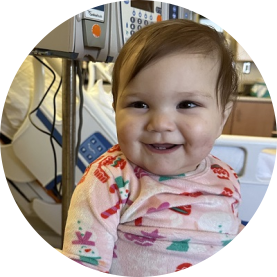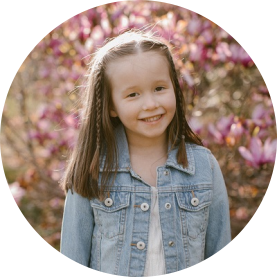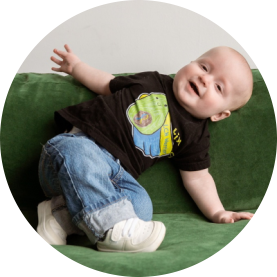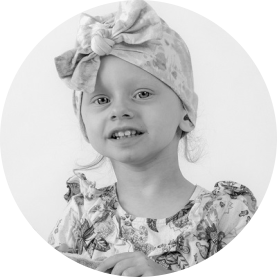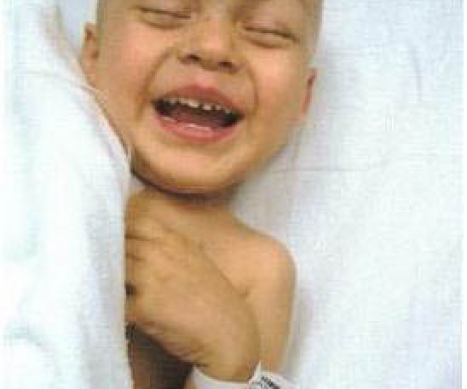

Click the images to see them larger above!
Learn more about
Get the facts about and how our research projects are making a difference.
Learn More »John Paul was born on March 3, 2006. Officially my shortest labor, he arrived after only 30 minutes (completely natural). He was also my largest baby! He hit the scale at 8 lbs. 10.5 oz. (which makes no sense because he was only 1 day overdue, and now he's my most petite child). Later, we would find out that a high birth weight was characteristic of Wilms tumor.
I was diagnosed with Leiomyosarcoma (in the skin cells of my back, treatment was surgery to excise the area, no chemotherapy or radiation needed) in November of 2008, while 8 months pregnant with our youngest baby, Gabrielle. After I gave birth, they sent the baby's placenta to pathology to ensure that there were no cancer cells transferred to her. I insisted that they never checked John Paul's placenta. I asked if they were sure John Paul was okay and didn’t have any type of cancer. Everyone acted like I was just paranoid. I had this feeling that my cancer was just the beginning. Call it a mother's intuition. I just kept it to myself in the meantime.
In March, John Paul turned 3-years-old, and the whole family had a cold. John Paul's seemed to last a little longer than the rest of us. He had been very tired and wanted to be held all of the time. I just figured that when he cried "Mommy, hold me too," that he was just becoming jealous of the new baby. I told him "you have to be a big boy and walk, Mommy can't hold both of you." He was in the mother's day out program at the school and would either fall asleep or cry most of the day. I finally just kept him home for about a week or so, figuring that he needed extra rest and attention and we would try again the next week. By then, he did not have any cold symptoms at all, so I just felt that it was probably him dealing with jealousy from his new sibling, which was odd because he had never been jealous of her previously. We had his 3-year-old exam scheduled, and while at the doctor's office, our family doctor noticed that his abdomen was hard. He figured that perhaps his intestines were inflamed or infected and ordered an ultrasound. I didn't want to wait around for the referral for the ultrasound so I headed straight to Texas Children's Hospital. I had been in the ER with each of our children two to three times for cold viruses, allergic reaction to baby wipes, and even our oldest was admitted at 3 months with a kidney infection. So I was expecting them to do urine sample, blood work, and send us home. But nothing would prepare me when the doctor came into the room and told me that our son had a tumor on his kidney and he suspected it to be Wilms Tumor, a type of childhood cancer. He was classified as Stage 4 Wilms Tumor because it had spread to his lungs. There were two nodules. After 6 weeks of chemotherapy, the nodules responded & had shrunk. They did 8 treatments of radiation therapy & the spots on his lungs completely dissolved.
As he slept, I pulled out my laptop right there in the ER, and started searching the internet for Wilms tumor. Unlike Leiomyosarcoma, the more I read about Wilms tumor, the less worried I became.
He had the tumor removed the next morning, along with his left kidney. The oncologist at Texas Children's made it seem like we would just breeze through the 25 weeks of chemotherapy and radiation. Wilms tumor is a less aggressive cancer, more easily treated than other cancers like leukemia. All of his chemotherapy would be outpatient. It baffled the doctors that we had such a rough beginning, middle, and end. We were probably hospitalized half of the last 6 months of treatment. First the Vincristine made him constipated, and then he did not want to eat and got dehydrated. Within a few days, we were admitted back into the hospital, and then discharged after a few days. The cycle seemed to just repeat itself. We did this about three times before they brought out Megestrol. This drug made him want to eat despite the other things going on. It kept us out of hospital for the most part. That is until he had pneumonia in July for a whole week, and then he had dropped such a considerable amount of weight, that they wanted to consider a feeding tube. We were against it at first, because he was eating and not losing weight. However, the doctors were worried because he was not gaining any weight either.. He only had 2 more chemotherapy treatments left. We felt that the feeding tube was a bit drastic since we were so close to the end. We compromised and decided to go with IV nutrition for 12 hours at night as he slept. Learning how to hook him up every night, seemed very complicated. I was surprised when I got it down the first time and didn't even have to call the nurse for assistance. After 3 weeks on TPN & Lipids, John Paul ran a fever of almost 102 degrees one night. I raced him to the ER. They gave him antibiotics and sent us home. By the time we got home at 4am, his temperature was nearly 105. I called the oncologist who told me that was normal and to just monitor it from home. I told him "I'm already half way back to the hospital; I don't feel comfortable monitoring a chemotherapy kid with a 105 degree temperature. I don't feel comfortable monitoring a healthy child with that high of a temperature!" So there we sat in the ER triage again, given a stronger dose of IV antibiotics and we were discharged directly to our clinic appointment. Fortunately the culture results were back. He had a bacterial infection and he was admitted immediately. They did IV antibiotics for a few days, with a little success, but they felt that his port-a-cath line was infected and needed to be taken out. So we had it removed. He was a pin cushion the next few weeks with no main line. Between attempting an IV line, having the veins blow almost always, and getting a finger poke every morning for the blood culture, John Paul was getting extremely frustrated with being in the hospital. To make matters worst, he is a picky eater to begin with and does not like hospital food at all. So Daddy would bring pizza almost every night and we pushed 350 - 500ML's of Pediasure everyday through a syringe. We had to stay in the hospital 10 days after his port-a-cath was taken out, because that was the duration of the antibiotic through IV. We finished on the day we had planned to get his last chemotherapy.
It was not easy juggling a baby & a 3-year old doing chemotherapy and radiation. The baby tagged along to all of the appointments and was there in the hospital for every part of the journey. I have probably put in miles walking the hallways at the hospitals.
John Paul finished his last chemotherapy on October 5, 2009. He had a CT scan the following week, and the oncologist met with us for his official "LAST EXAM." Unfortunately, we received very bad news - the last scan revealed that there were four new nodules on his lungs. He would need to be treated with inpatient chemotherapy this time. John Paul would be admitted 4 - 7 days every three weeks for the next year. John Paul was so fragile - he had lost so much weight that they would have to do a feeding tube to get him through a whole year of intensive inpatient treatments. The oncologist wanted to repeat the scan again one more time prior to beginning treatments. They scheduled the surgery for the day after we would get the newest CT scan results, they needed to put his port-a-cath back in and also put in his feeding tube.
Last Thursday we received life-changing results. John Paul would not need chemotherapy. The spots on his lungs had minimized, one spot had even dissolved, and one spot was the same size - a tumor would have grown. We were so relieved that the most difficult year of our life would finally be over. However, I would soon find out that I had tested positive for having the gene mutation for Hereditary Leiomyomatosis and Renal Cell Cancer (HLRCC). What does this mean for our family? We will have to get all the children tested to see if they also exhibit this gene. My siblings will also have to be tested and along with their children, as well as the rest of my family, including my parents. If any of them have this mutation, they will need annual CT scans to make sure that any cancer can be detected early and treated effectively. It is a young cancer, typically affecting people who are 20 - 35 years old.
Hopefully John Paul's cancer story ends there with no continuation of his journey in overcoming this challenge. All we can do with the information we now know is take life one day at a time.
You may follow our journey here: http://www.OurBrotherHasCancer..com
A poem I wrote for my son:
"Little Superman"
by Mommy
Mommy's hero.
Mommy's strength.
Mommy's little Superman.
You are so small, yet so wise.
You are so brave & bold.
You are my hero, my little man.
Cancer was our nightmare,
I wanted to wake up.
But you were so strong & tough.
Mommy dries your tears
and clears your fears.
But little boy, I know it's been rough.
And now you are a survivor...
You may be the smallest,
but you are the strongest man in my life.
I feel so humble & small next to you now,
because you are so big & strong.
The world will see your strength, especially someday your wife.
You are my 3-year-old superman.
You beat up that bad guy,
and put cancer back in its place.
And now you must know,
your mother's love is never ending.
I cherish you for always, you can never be replaced.
So I know you are so brave.
But please as you get older,
don't put your mother's love to the test.
Don't do anything crazy & reckless.
Just work hard, appreciate life & love.
Be a good man and always do your best.
Written by Elizabeth Hornbeck, John Paul’s Mother
11/09
Donate in Honor of John Today!
Your donation helps to fund critically-needed research to find better treatments and cures for children with cancer.


